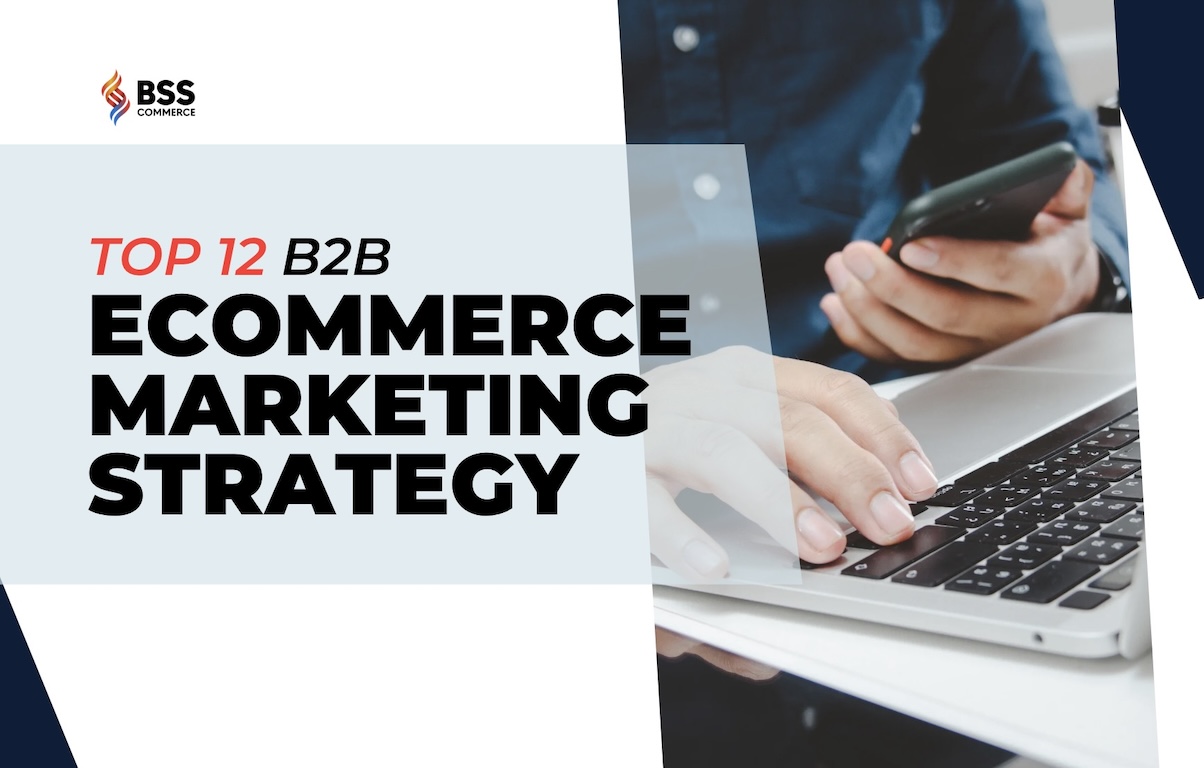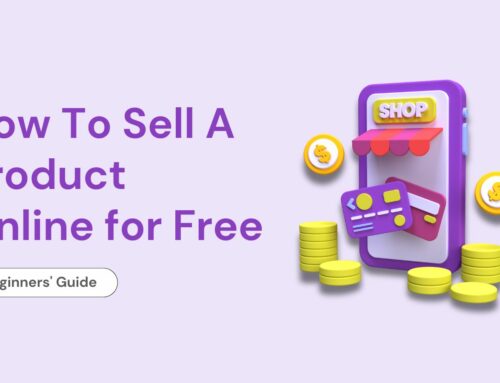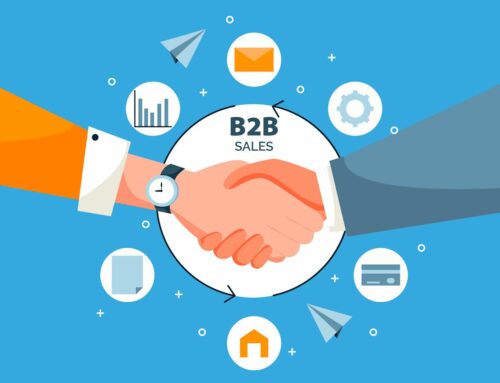Are you interested in getting an edge in ecommerce? And you are operating a B2B business? A B2B ecommerce marketing strategy is crucial whether you are a small business or a large enterprise. Why? The right strategy doesn’t just acquire clients, but gains their confidence, makes them more involved and makes them buy.
Are you ready to make B2B ecommerce even better? In this blog, BSS Commerce will discuss why B2B marketing strategies are crucial, some of the issues, and the 12 best approaches to get there now. Let’s dive in!
Contents
- 1 Why B2B Ecommerce Marketing is Crucial
- 2 Top 12 B2B Ecommerce Marketing Strategy
- 2.1 1. Content and Inbound Marketing
- 2.2 2. Website Design and User Experience
- 2.3 3. Streamlining the Checkout Process
- 2.4 4. SEO and Search Engine Marketing
- 2.5 5. CRM and ERP Integration
- 2.6 6. Social Media Marketing
- 2.7 7. Influencer Marketing
- 2.8 Account-based Marketing (ABM)
- 2.9 B2B Marketplaces
- 2.10 Customer Loyalty Programs
- 2.11 Omnichannel
- 2.12 Email Marketing
- 3 Comparison between B2B Marketing Strategy and B2C Marketing Strategy
- 4 Conclusion
Why B2B Ecommerce Marketing is Crucial
Overview of B2B Ecommerce
B2B (business to business) ecommerce refers to the electronic exchange of goods and services between business organizations through the use of electronic media. This is not the same as the more commonly talked of B2C (business to consumer) ecommerce where the target market is consumers.
B2B customers are often an organization’s purchasing department and they consume a great deal of time in the decision making process. It often takes more time to close a sale than it does in business to consumer marketing. When it comes to what is relevant to B2B buyers, suitability of the product, return on investment and solutions that assist in business operations are most relevant. B2B ecommerce also has customized prices, product lists, and accounts to suit your company’s needs. B2B businesses usually place large orders in order to meet their needs.
Benefits of a Well-Planned Marketing Strategy

A well-planned marketing strategy is important to any B2B organization. It is the key to business development, relationship building and business longevity. Today, those companies that take their time and effort to write a comprehensive marketing plan will be rewarded with more than just immediate benefits.
Key benefits of well-structured b2b marketing strategies include:
- Targeting the right audience: It defines the target customer and his wants. Apart from it, it adjusts the campaigns to the best ways of using the resources and avoiding the wastage of resources. Consequently, lead conversion and the rate of return on investments are improved.
- Improving brand visibility and credibility: It helps consistent messaging and high-quality content, positions businesses. Your company will be an industry leader with a strategic omnichannel presence and builds trust between potential clients.
- Measuring and adapting performance: Data analytics will help you to track the success of a campaign, customer engagement and conversion rates. That will provide valuable insights to help refine strategies and close weaknesses, and to help businesses capitalize on successful tactics.
- Boost long-term customer relationships: It interacts with customers in all the stages of the buyer’s process. Besides, it keeps constant communication with the customers and offers constant support, aims to get the customer to come back, and have others speak well of the product.
- Aligning goals and streamlining operations: This also helps businesses to concentrate on specific goals, enhance the strategies and offer a great competitive edge to a competitive market.
Last but not least, a well-planed marketing strategy is much more than a growth tool, it is a necessity for long-term success and flexibility in an ever-changing market.
Common Challenges in B2B Ecommerce Marketing

B2B ecommerce has high growth potential but also has some problems that businesses have to face. All these problems are essential to be solved to have an overall successful and efficient marketing plan.
- Complex buying processes: B2B transactions usually require several individuals, and a considerable amount of time, to authenticate particular characters.
- Difficulty in reaching the right audience: It is hard to find and target niche markets or highly specific buyers when businesses are still using outdated data and do not have the tools to segment their customers precisely.
- Building trust and credibility: In contrast to B2C, the buyer in the B2B market needs more trust, because B2B buying is normally a bulk and long-term buying. That is why quality content, case studies and consistent brand messaging are the ways businesses have to become authoritative.
- Balancing personalization and scalability: Personalized marketing is essential for engagement, but it’s resource-intensive and hard to scale to a broad customer base.
- Navigating technological challenges: Ecommerce platforms are not easy to develop and sustain and a lot of knowledge and capital are invested in systems that link (such as CRMs and ERPs) and in data protection.
However, for any business to succeed in addressing these challenges, it requires to come up with out-of-the-box solutions, harness on analytics and remain customer centric. If managed well, B2B can enhance the efficiency of business operations, enhance the buying experiences and foster long-term growth for B2B companies in the context of the increasing competition in the ecommerce sector.
Top 12 B2B Ecommerce Marketing Strategy
1. Content and Inbound Marketing

Content is king in the B2B ecommerce world. Inbound marketing is not about pushing products but about pulling in customers with valuable informative content. Blogs, whitepapers, case studies and industry guides help establish your brand as an expert. They also solve customer pain points. Your content strategy is strong if it educates your audience and drives organic traffic and leads.
B2B buyers spend a lot of time researching before they make a decision. If you can create targeted, insightful content to help them through their purchase journey, you can influence their purchase. For example, whitepapers can address industry-specific pain points and webinars give actionable solutions.
Inbound marketing is the pairing of nurturing tools like automated emails or content hubs with the ability for businesses to build lasting relationships. The trick is to put problem-solving ahead of sales – be a partner, not a seller.
2. Website Design and User Experience

Your B2B ecommerce marketing strategy is built around your website. A smooth and easy-to-use platform where buyers can find what they want without hassle is what buyers want. The design is simple, clean, and responsive with intuitive navigation. This allows customers to spend more time searching and less time searching.
Product catalogs are optimized, search filters are advanced, and experiences are tailored for decision maker’s lives. Additionally, site speed and performance directly impact customer satisfaction. A slow site will make your competitors abandon you.
Shopify Plus Development Services by BSS is a powerful solution for B2B businesses looking to scale. BSS can help you determine if you need custom features. Smooth integration or user-centered design so that your platform supports a smooth user experience that converts visitors into repeat customers
3. Streamlining the Checkout Process
B2B checkouts are not as straightforward as B2C checkouts; they involve quantity, approvals, and terms. This is a rather intricate process, which has to be made less complicated to enhance the number of conversions. This is what buyers want – efficiency and flexibility – so give it to them.
Enter with the availability of a lot of payment opportunities like net terms, bank transfers and credit cards. Make energy-saving smart technology features like bulk ordering, tiered pricing and saved purchase histories a part. Transparency is also important: no shipping fees that come as a surprise, and no surprises in the order summary.
It reduces the operations and enhances the rate of purchasing by automating some processes like payment confirmation or order approval. Establishing trust and making sure that buyers revisit your store is not only convenient but it is also a well optimized checkout.
4. SEO and Search Engine Marketing

Search Engine Optimization (SEO) guarantees your business remains visible to B2B buyers searching for solutions. SEO is more than just keywords, it’s about relevance, speed and authority. Qualified traffic to your site is driven by high ranking product pages, optimized content and targeted landing pages.
First, start with keyword research that’s buyer intent focused. Take for example long tail keywords that address specific pain points or solutions. Use pair SEO with SEM campaigns like Google Ad campaigns to dominate search results and get leads faster.
But if your site is slow, none of that matters: buyers will bounce before they even start. BSS Shopify Speed Optimization Services help you out there. By improving page load times and mobile responsiveness, BSS ensures your SEO efforts deliver measurable results, keeping visitors engaged and improving conversions.
5. CRM and ERP Integration

Efficiency is key to B2B ecommerce marketing strategy success, and integrating a CRM with an ERP (enterprise resource planning) system can make the difference. It connects customer interactions with backend operations to ensure workflows run smoothly.
CRM tools make it possible to track and optimize leads, interactions, and opportunities, managing inventory, orders, and supply chain data from an ERP system. However, when integrated, these systems help sales teams to have real-time insights, so think of being able to close a deal while confirming stock availability or pricing.
This integration takes away all the manual processes, reduces errors and makes collaboration between the teams easier. It ultimately ties sales, service, and operations together to create a frictionless experience for your B2B customers.
Check out: B2B Integration Platform – A Comprehensive Guide
6. Social Media Marketing
Social media isn’t just for B2C – it’s an increasingly effective tool for B2B ecommerce. It’s also a good choice among other b2b marketing strategies. LinkedIn, Twitter and Facebook are platforms that allow businesses to reach decision makers directly, share important insights and build trust.
The power of LinkedIn for B2B brands is particularly strong. Providing thought leadership from the industry, case studies, and actionable tips to share will help you position yourself as an expert and can help attract prospective clients to your business. LinkedIn or Facebook paid ads further expand your reach to exactly the right decision makers with precision.
7. Influencer Marketing

B2B influencer marketing might not seem conventional, but it’s incredibly effective. When it comes to buying, buyers often trust voices they know, like, and trust—whether that’s an industry expert, thought leader, or niche professional. Your credibility will be boosted and your audience will increase by collaborating with influencers.
A few ways influencers can promote your brand include hosting webinars, writing guest blogs or writing reviews of your products. When they point out that your solutions address real problems, it makes their backing stronger, and their backing is more weighty. Decision makers really resonate with the authenticity of influencer content.
When done right, influencer partnerships can create awareness and influence a purchase. It’s not about big-name endorsements, it’s about real relationships that create trust.
Account-based Marketing (ABM)
Account Based Marketing is a target-specific approach focused on high value accounts. Unlike casting a wide net, ABM narrows your focus to the accounts that will deliver the greatest ROI.
First, figure out who you’re targeting. Once you define, create personalized campaigns: custom emails, tailored content, and industry-specific case studies. The better your messaging is, the more likely they are to pay attention to it.
CRM and marketing automation platforms give you the ability to monitor engagement, and fine-tune campaigns. ABM aligns sales and marketing efforts so that you deliver value to key decision makers and strengthen relationships.
B2B Marketplaces

B2B marketplaces like Amazon Business, Alibaba, and ThomasNet have transformed how businesses buy and sell products. By joining these platforms, you gain access to a global audience actively seeking solutions. It’s an excellent way to expand your reach without overhauling your ecommerce site.
Marketplaces offer built-in trust and infrastructure—buyers know they’ll find verified sellers, transparent pricing, and reliable reviews. For instance, if you’re a manufacturer, listing your products on Alibaba can connect you with distributors across continents.
However, competition is fierce, so you’ll need to optimize your listings. High-quality images, accurate product descriptions, and competitive pricing ensure your offerings stand out. Combine marketplaces with your primary ecommerce site for a multi-channel strategy that drives consistent growth.
Customer Loyalty Programs
While B2C ecommerce is familiar with loyalty programs, B2B ecommerce also benefits from it in a like manner. It is the fact that it costs much less to retain a customer than to attract a new one. A good program will ensure that a buyer continues to patronize the business.
You begin with discounts on bulk orders, free shipping or first access to new products. Imagine, a wholesale supplier could present tiered loyalty rewards in relation to order volume—that is, the more spend, the bigger the rewards.
Loyalty programs are not only an incentive for repeat business, but also a tool to build the relationship. CRM tools can also make customers feel valued with personalized rewards. This creates trust and makes your brand a preferred partner over time.
Omnichannel

Omnichannel marketing guarantees the B2B buyers a smooth transition across the online and physical platforms, and the mobile phone. Today’s decision-makers can search for a product on a website, communicate with the sales representative, and even order the product via an app.
To reach these goals, the message and branding should be consistent all over the place. For instance, if a buyer visits your site and sees a product, they should be able to see the same price and offers in an email campaign. These are touchpoints which CRMs and ERPs, for example, assist with consolidating to make certain that nothing slips through the cracks.
Real omnichannel strategy is about following the buyer’s path and making it easier for her/him and increasing the level of satisfaction. When done effectively, it makes the buying process easy and makes the customer a repeat buyer.
Email Marketing
Email marketing is still one of the most effective B2B ecommerce marketing strategies. Sending updates isn’t just about it, it’s about delivering relevant, personalized content at the right time.
For instance, nurture campaigns can guide through the buying journey through the usage of blogs, case studies, and videos. Besides, the targeted emails can be used to sell new products, to introduce a special offer, or to provide an individual piece of advice.
Automated email workflows help you to avoid the need to remind yourself to send an email and can save time. An example is the follow-up of abandoned carts or the reminder of replenishment opportunities to keep the sales pipelines alive. Email marketing is a form of direct marketing that incorporates elements of both personalization and automation in an effort to increase both response and sales.
Comparison between B2B Marketing Strategy and B2C Marketing Strategy

B2C ecommerce marketing strategy and B2B ecommerce marketing strategy both seek to drive engagement and conversions, but their approaches are dramatically different because of who their audiences are and what they want to accomplish. Below is a comparison across key criteria:
| Criteria | B2B Ecommerce Marketing Strategy | B2C Ecommerce Marketing Strategy |
| Target Audience | Businesses, decision-makers, and procurement teams | Individual consumers or households |
| Decision-Making Process | Rational, collaborative, often involving multiple stakeholders | Emotional, quick, and often driven by personal preferences |
| Motivations and Drivers | ROI, efficiency, long term solutions | Desire for satisfaction, convenience, and immediate benefits |
| Content Focus | Whitepapers, case studies, webinars – all in-depth educational content | Videos, ads, etc. that are engaging, visually appealing and entertaining |
| Relationship Building | Personalized interactions that are high in trust building, long-term partnerships | Usually focusing on loyalty through discounts or promotions, transactional |
| Marketing Channels | Trade shows, LinkedIn, email campaigns, and account-based marketing | Influencer collaborations, social media, TV commercials and E-Commerce platforms |
Specific to each market demand is key to designing a strategy. B2B content is relationship building, and value-driven, while B2C content is more about personal connections and brand experiences.
Conclusion
If you can select the right B2B ecommerce marketing strategy, your business can be transformed to reach more customers, foster better relations and sell more products. Each approach is a development process, and it doesn’t matter whether one employs SEO, content marketing, CRM system incorporation, or considers omnichannel strategies. Begin implementing these strategies now and see the growth of your ecommerce business improve.




